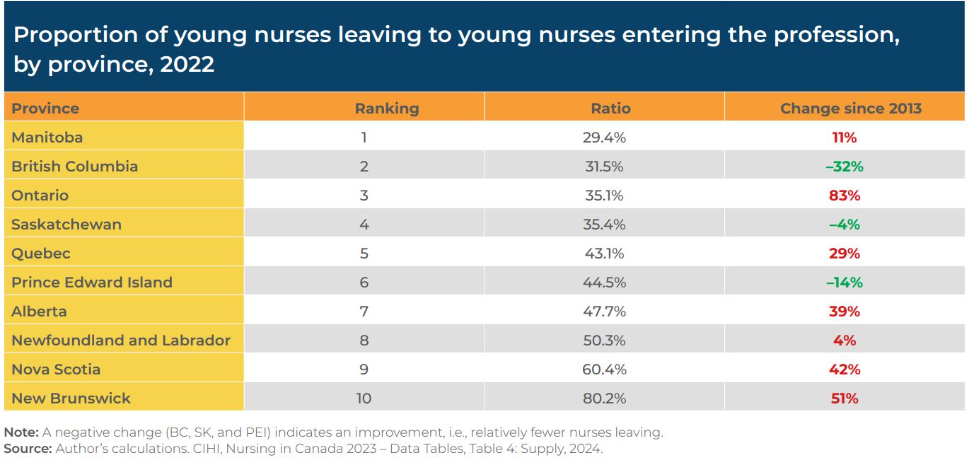'Project participants faced challenges that complicated their integration'

Quebec’s bid to hire foreign nurses to fill open positions in the province has led many to a lot of hardships as they come to the province, according to an internal report.
That’s because the program fails to prepare the recruits for the training program itself, according to the report, which was cited in an article by The Canadian Press (CP).
The $65-million initiative, launched to address acute nursing shortages in Quebec, aims to train 1,000 nurses from West Africa and other francophone regions. The program includes what the government describes as “refresher training” to bring participants’ credentials in line with Quebec’s regulatory standards. The internal report focused on the first phase of the initiative.
However, “in most regions, project participants faced challenges that complicated their integration and could have had a negative impact on their full participation in the refresher training,” reads part of the internal report, according to CP.
Heavy course load for Quebec nurses
One worker from Africa who flew to Quebec in 2023 says that they did not expect the heavy course load that they had to take nine to fourteen months.
“We were treated like children... The right information was not revealed to us,” says the worker who earned their nursing license in their home country in 2019, according to CP.
Also, the nurses were not informed about the consequences of failing the refresher training, and that prospect is causing them stress.
“If recruits fail a course, they are expelled from the program and lose access to financial support, including the part-time work as a caregiver included in the program,” reports CP in the article posted in Global News. “In theory, they can re-enroll, but while waiting for classes to be offered again, they are not allowed to work, a situation that can last for months.”
One worker told CP that if they had known how the program worked before coming to Canada, he would not have left his country.
Female physicians in the U.S. have shown increased interest in moving to Canada, according to a previous report.
The internal report also notes that Quebec had a hard time finding teachers and internship supervisors for the training program itself, highlighting the labour shortage in the province’s health system.
Financial hardships, culture shock
The CP report also notes that the foreign nurses experienced financial hardships; a lack of housing, daycare spaces and transportation; and culture shock.
Discussions around abortion and medical assistance in dying “created emotional and ethical tensions” for some students, one CEGEP notes, according to the report.
“I don’t understand why these issues were not properly taken into account when developing this program,” says Fo Niemi, director general of the Center for Research-Action on Race Relations.
Niemi had previously criticized the program. In a report from The Nigerian Eye in August 2024, he claimed that at least 50 recruits had encountered bureaucratic barriers or discrimination, resulting in their expulsion and loss of support.
In 2023, Ottawa introduced an expedited credentialing service from the National Nursing Assessment Service (NNAS). Under the service, NNAS advisory reports are now issued in participating provinces within no more than five days of all documents being received, making for faster processing for internationally educated nurses (IENS) looking to practice in Canada.
Most foreign nurses pass ‘refresher training’
Meanwhile, Xavier Daffe-Bordeleau, spokesperson for the Ministry of Immigration, notes that Quebec’s program to recruit nurses from West Africa and other francophone regions has been a success.
By the end of February, 867 people had successfully completed the refresher training, including more than 90% of students from the first two phases, he says, according to CP.
The ministry spokesperson also says that most students in the following phases received an offer of accommodation before arriving in Canada.
The internal report focused on the first phase of the program. The fifth phase of the program is now underway.
“Building on the experience gained from previous cohorts, the combined efforts of supporting people from abroad several months before their arrival have helped minimize the pitfalls associated with the settlement process,” Daffe-Bordeleau says.
Shortage of nurses in Quebec
Wuebec is facing a massive shortage of nurses. In 2021, Quebec’s Health Minister said that the province was short of 4,000 nurses. However, that same year, 6,524 nurses left the profession, notes Emmanuelle B. Faubert, Economist at the think tank Montreal Economic Institute (MEI).
The shortage of nurses is expected to grow to 28,000 by 2026, due in part to how many are leaving the profession, she says.
For every 100 new nurses in Quebec, 43 are leaving the profession before they turn 35, City News previously reported, citing data from MEI.

Source: Montreal Economic Institute (MEI)/City News
Overall, 75 per cent of nurses intend on leaving the industry in the next 12 months, according to a Blu Ivy Group report released in December 2022.




